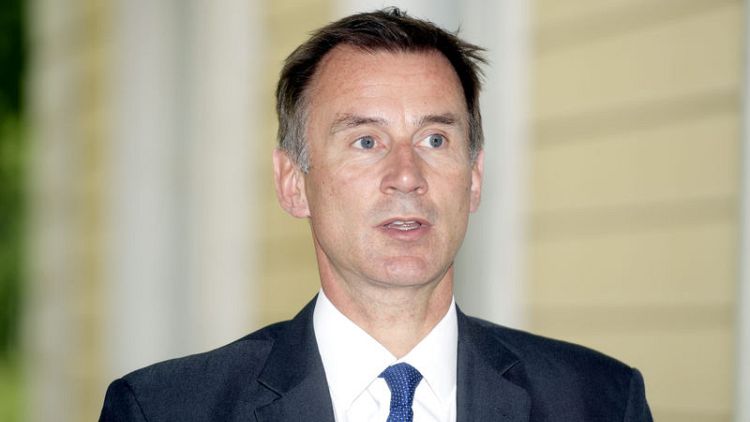By William James
LONDON (Reuters) - Britain will press the European Union on Tuesday to increase sanctions against Russia, saying it should stand "shoulder to shoulder" with the United States, which hit Moscow with new economic restrictions this month.
The Foreign Secretary, Jeremy Hunt, will say that Russian President Vladimir Putin has made the world "a more dangerous place", and that after a chemical weapons attack in the English city of Salisbury, the EU should apply more pressure to ensure Russia sticks to international rules.
"Today the United Kingdom asks its allies to go further by calling on the European Union to ensure its sanctions against Russia are comprehensive, and that we truly stand shoulder to shoulder with the U.S.," Hunt will tell a Washington audience in his first major speech since his appointment in July.
"That means calling out and responding to transgressions with one voice whenever and wherever they occur, from the streets of Salisbury to the fate of Crimea."
Asked about Hunt's speech, Russian Foreign Minister Sergei Lavrov said Britain had too high an opinion of itself and was trying to impose its Russia policy on the EU and the United States, the RIA news agency reported.
EU officials said Britain had not yet proposed any new sanctions on Russia to the other 27 EU member states.
Britain, the EU, and the United States blame Russia for a nerve agent attack against a Russian double agent in Salisbury earlier this year. The Kremlin denies involvement.
Citing the Salisbury incident, Washington has imposed sanctions against Moscow covering national-security related goods. It has promised more hard-hitting measures unless Russia gives "reliable assurances" it will no longer use chemical weapons.
The sanctions sparked a sell-off across Russian markets, and pushed up the country's cost of borrowing - with both likely to worsen if a second wave of measures is enacted.
EU DIVIDED
Britain is preparing to leave the EU next March, but currently follows EU-level sanctions policy on Russia, agreed by all member states. The EU recently agreed to renew sanctions against Russia relating to its annexation of Crimea from Ukraine and other activity in the region.
But the EU has not imposed further economic sanctions specifically linked to Salisbury, although it strongly condemned Moscow and joined international action to expel Russian officials after the attack. Its measures against Russia include finance restrictions and arms exports.
Any new EU sanctions would require unanimity among all 28 states. The current economic sanctions against Russia are in place until the end of January, 2019, as well as curbs on doing business with Crimea.
But while some countries such as Poland and the Baltic states back Britain's hawkish stance towards Russia, some other member states including Italy, Austria and Greece advocate more engagement with Moscow.
In Tuesday's speech Hunt will also criticise China - like Russia a permanent member of the U.N. Security Council - over what he sees as its inaction over Crimea and chemical weapons.
On Brexit, where negotiations have become bogged down as the deadline for reaching an exit deal with the EU approaches, Hunt will repeat his call for the bloc to show flexibility.
"Now is the time for the European Commission to engage with an open mind with the fair and constructive proposals made by the Prime Minister (Theresa May)," he will say.
Hunt, who took over from Boris Johnson as Britain's foreign minister in July, will meet U.S. Secretary of State Mike Pompeo and other U.S. officials on Wednesday, and address the United Nations Security Council on Thursday.
(Reporting by William James; additional reporting by Gabriela Baczynska; Editing by Richard Balmforth and Gareth Jones)
